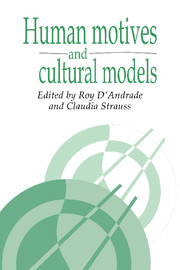Book contents
- Frontmatter
- Contents
- List of illustrations
- Preface
- List of contributors
- 1 Models and motives
- Part I Cultural models as motives
- Part II How do cultural models become motives?
- Part III Cultural models as motives reconsidered
- 8 Motivated models
- 9 What makes Tony run? Schemas as motives reconsidered
- 10 Afterword
- Index
10 - Afterword
Published online by Cambridge University Press: 05 June 2012
- Frontmatter
- Contents
- List of illustrations
- Preface
- List of contributors
- 1 Models and motives
- Part I Cultural models as motives
- Part II How do cultural models become motives?
- Part III Cultural models as motives reconsidered
- 8 Motivated models
- 9 What makes Tony run? Schemas as motives reconsidered
- 10 Afterword
- Index
Summary
The preceding chapters have tried to explore the usefulness of the idea that cultural models can have motivational force. What now can be concluded about this idea? What issues have arisen from this work?
Practicalities of psychological assessment
At this point, several things stand out which were previously unseen or obscure. First, at the beginning, it was not known whether it would be difficult or easy to assess the motivational force of particular cultural models. It is one thing to argue that, on various theoretical grounds, some schemas, and therefore some cultural models, should have motivational properties, and that these properties should be assessable. It is another thing to identify, in a real ethnographic study, the motivational properties of a specific cultural model.
Overall, assessment of the motivational force of cultural models appears to be a feasible task. The authors had no special difficulty in determining the degree to which the models they were investigating functioned as active goals for specific individuals. These models ranged across a variety of domains; romance, marriage, gender, the self, emotion, childhood “stages,” witches, gods, and water glasses. Based on the results of all the chapters, it seems fair to conclude that the assessment of the motivational force of a cultural model is well within the capacity of a competent ethnographer.
Why should this be? The usual account is that motives are hard to identify and even harder to measure.
- Type
- Chapter
- Information
- Human Motives and Cultural Models , pp. 225 - 232Publisher: Cambridge University PressPrint publication year: 1992
- 9
- Cited by



